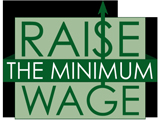Employees Minimum Wage Should Be Raised, Employers Say No
Post Views 0
It would be another 25 years before a national minimum wage was set. It was turned into a federal law by the Presidential seal of Franklin Roosevelt in 1938 making it compulsory to pay every worker a minimum of 25 cents per hour. It was a path breaking move that revolutionized the employment industry. It raised the workers standards of living and helped alleviate poverty.
Every few years, the minimum wage would go up, in keeping with inflation and allow millions of working Americans to escape the clutches of poverty and move towards a middle-class lifestyle. However, the growth began to register a downward trend in the early 1970’s and since then it has gone down by around 25 percent.
The minimum wage today is $7.25. However, if calculated in current fiscal values, in 1968, it would be worth $10.
Sen. Tom Harkin of Iowa said, “Think about the people that in 1968 got the minimum wage, [and] then think about the group today. It’s basically the same group, but they have 30 percent less buying power.”
Senator Harkin, a Democrat, has introduced a bill in Congress seeking to raise the minimum wage to $9.88 an hour. This would impact millions of American workers, but support for his bill is not as forthcoming as much as he would have liked.
One of the promises, on which President Obama had campaigned during the last election, was that he would raise the minimum wage. He has reneged on it. His opponent for the White House, Mitt Romney has said that he is in favor of having a minimum wage that corresponds with the inflation. But he has since done a volte face and now says that he is against an increase.
The Economic Policy Institute states that if Harkin were to get his bill approved it would mean higher wages for 30 million Americans, that’s 10 percent of the country’s population. Harkin argues that more money in the hands of the hourly wage earners would mean increased spending and help boost the economy.
“People who are making the minimum wage, basically they’re spending just about all their money because they don’t have much left,” Harkin says. “So if you give them a raise, it means more for our gross domestic product.”
He estimates that his bill, if it pegs minimum wage to $9.88 an hour, will mean about $25 billion more for GDP, 100,000 more jobs and 28 million Americans would get a raise.
He said, “If my proposal went through, a $15,000 a year worker will make $20,000 a year. $5,000 a year is significant … [It] may not get them out of poverty, but it makes life better.”
He strongly refuted what he said were unverified claims, that raising the minimum wage would increase unemployment. On the contrary, he said it was proven that when minimum wages were increased, employment actually went up.
Harkin said that he was not very optimistic about the chances of the bill as he was certain that the Republicans would not let it go through. However, it would send a strong message to the worker voting community, where the Democrats stand on this issue and what the republicans feel about it. It, he said, can be the difference between allowing and not allowing the very poor to have decent living standards.
The example of 50-year-old Margaret Lewis, illustrates the woes of the workers from the lower economic strata of society. She rises at the unearthly hour of 1 a.m. She has opted for the early shift, or late-night shift, whichever way you look at it, to ensure that she has time to feed and send her four children to school every day.
She works as a transporter for the disabled at O’Hare International Airport, in Illinois, making minimum wage. She considers herself fortunate that the minimum wage at Illinois is a dollar more than the national rate.
Inspite of pushing herself to the limit and adding the tips to her wages, she makes about $18,000 each year. She is still below US poverty levels, for a family her size, by around ten thousand dollars.
She said that more than half her earnings go into the rent for her modest abode. With the rest she barely manages to scrape through food stamps, thrift store and other rigorous austerity measures. She says that part of her house rent she pays in kind by doing sundry work for the owner.
“I never can pay a whole rent,” Lewis says. We do janitor work around [and] keep the grass cut. In the winter, we make sure the porch is shoveled.”
Moreover she says that she stays in a neighborhood were shootouts are common. However, she cannot move out because she would not be able to get affordable rent elsewhere.
Passing Harkin’s bill would mean an increase of around $2000 in a year for someone like Lewis. What a difference that would make.
“It might not sound a lot to most people, but to me that much in a year would make a big difference in my household,” she says.
Opponents however argue that it would make a bad job situation even worse. Joe Olivo, who owns a small printing press in New Jersey that employs 47 people said, that if the minimum wage was raised he would have no option to lay off some of his employees.
“What happens is the employee who’s been here for 3 years and has more experience than a person making an entry-level wage, they will rightfully want more for their seniority,” Olivo says. “So what it does to me as a business owner, by pushing up wage scale, it increases my expenses.”
This he says will mean many things; either he must increase his income, which is something he would have already done if it was possible. Considering that it cannot be done, he must cut his other expenses and the only option left would be to cut employees and not hire new ones, maybe even upgrade technology so that he can decrease the number of employees he needs.
“So it really hurts my current employees and it also prevents me from bringing on new ones,” he says.
Bill Dunkelberg, chief economist for the National Federation of Independent Businesses, who are against raising the minimum wage says, businesses are not social service providers and cannot pay more than what value a worker brings to the workplace. He said that there is an earned income tax credit in place, where “we provide supplemental income to people who are working but need more money.”
Eighteen states in the country have a minimum wage that is higher than the national level, while four states actually have exemptions and even lower minimums.
Employees Minimum Wage Should Be Raised, Employers Say No by Harrison Barnes


 Best and Worst States for Teachers to Teach
Best and Worst States for Teachers to Teach  San Diego County Back to Full Employment
San Diego County Back to Full Employment  Job Growth Expected in West Michigan Through 2015
Job Growth Expected in West Michigan Through 2015  10 Jobs with the Fastest Growing Salary in 2017
10 Jobs with the Fastest Growing Salary in 2017  Top 10 Universities to Produce Hedge Fund Workers
Top 10 Universities to Produce Hedge Fund Workers  Top Five Reasons Talented Employees Quit
Top Five Reasons Talented Employees Quit